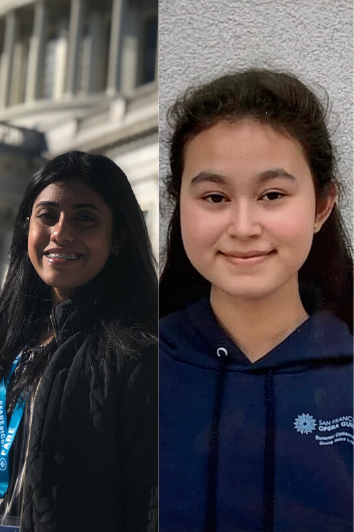Tackling Food Allergies and Food Insecurity in the Time of COVID-19: The FAFI Policy Scan
"During a pandemic, it is crucial to collect data that gauges the response of meal programs across the country as school districts implement to-go meals and pandemic safety protocols."
Guest post by Teen Advisory Group members Anisah Daniel and Celeste Virador

To participate in the Food Allergies and Food Insecurity policy scan, contact the authors at fafiteamofficial@gmail.com.
In the past year, food supply chains have experienced disruptions as the spread of COVID-19 impacted the nation. As COVID-19 continues to impact the lives of millions of Americans, low-income families continue to bear the greatest burden of the economic crisis. With food insecurity increasing, families with dietary restrictions are particularly vulnerable. School meal programs, which aim to provide assistance for students, must adapt to accommodate remote learning.
Our organization, Food Allergies and Food Insecurity (FAFI), seeks to understand how school feeding programs managed to serve vulnerable students with dietary restrictions during the pandemic. We initially created FAFI in early 2020 in response to school closures caused by the COVID-19 pandemic. FAFI was originally intended to be a FARE Teen Advisory Group project. We saw an opportunity to gather useful data on the policy decisions and actions of school food service providers.

FAFI launched its first project in March 2020: the FAFI Policy Scan. This data collection project had the main goal of tracking school district meal program accommodations for students with dietary restrictions during the COVID-19 pandemic. FAFI members and community volunteers utilize email templates to communicate with school districts across the country, and record the information in state-specific spreadsheets. All aspects of communication, including dates, contact information, and miscellaneous notes/questions, are recorded for each district.
Currently, FAFI has completed data collection in the state of North Carolina. Nearly nine in ten responses (87.5%) were positive, indicating that accommodations could be made or were being made for students with dietary restrictions. The remaining 12.5% indicated that accommodations could not or were not being made. Of all the schools contacted, however, a little over a third (36%) did not respond, leaving us with little idea of the accommodations being made.
There is no existing data set available that tracks how school districts across the United States have maintained meal accommodations for students with food allergies during the pandemic. During a pandemic, it is crucial to collect data that gauges the response of meal programs across the country as districts implement to-go meals and pandemic safety protocols. This policy scan is necessary because it will allow us to measure the COVID-19 response and will influence policy changes to better prepare for future disruptions.
While access to food is a human right, those with dietary restrictions know that access to safe food is just as important. FAFI hopes to continue advocating for food-insecure individuals with food allergies through the 2021 continuation of the FAFI Policy Scan, and to do so, we need your help! If you are interested in working at the intersection of food insecurity and food allergies, contact us at fafiteamofficial@gmail.com. Volunteering consists of data collection and communication with school districts across the country. We hope you'll join us in this valuable work.


